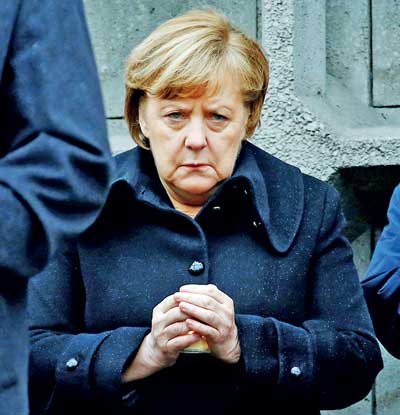Wednesday Mar 05, 2025
Wednesday Mar 05, 2025
Thursday, 28 December 2017 00:00 - - {{hitsCtrl.values.hits}}
BERLIN (Reuters) - If Angela Merkel becomes German chancellor again, nearly half of voters would want her to quit her term early, according to a poll offering a rare sign that domestic support for Europe’s most influential leader may be waning.
Merkel’s conservatives won a national election in September, setting her up for a fourth stint in office.
But they bled support to the far right, and talks on a three-way coalition with the Greens and the pro-business Free Democrats collapsed in November.
Merkel is now pinning her hopes on cutting a deal with the centre-left Social Democrats (SPD), who finished second in the election but have so far given a lukewarm response to the idea of renewing the ‘grand coalition’ that governed Germany between 2013 and 2017.
The YouGov survey, commissioned by Germany’s DPA agency and published in Wednesday’s Die Welt newspaper, showed 47% of respondents wanted Merkel to step aside before 2021, when her fourth term would end - up from 36% in a poll taken at the beginning of October.
By contrast, 36% want her to serve a full four years, compared to 44% three months ago.
The SPD, which lost ground among voters after the coalition with Merkel, has been reluctant to commit to a re-run as it looks to keep a skeptical rank and file on board.
SPD Foreign Minister Sigmar Gabriel, a former leader of the party, adopted a tough tone on Wednesday in top-selling daily Bild.
“If the chancellery continues to reject all the proposals for EU reform, there will be no coalition with the SPD,” he told the paper.
The SPD’s current leader, Martin Schulz, has championed deeper euro zone reform, calling for a United States of Europe by 2025.
Gabriel also said the conservatives needed to reform the health system to close the gap between private and state care.
An INSA poll in Bild put Merkel’s conservatives up 2 points at 33% and the SPD down 0.5% at 20.5%.
The far-right Alternative for Germany (AfD) which, capitalising on voters’ fears about growing inequality and the impact on Germany of Europe’s migrant crisis, entered parliament for the first time in September, was down 1 point at 13%.
Many commentators have suggested the AfD would make gains if new elections were held due to a failure on Merkel’s part to form a government.
Merkel’s conservatives and the SPD have said they will start exploratory coalition talks on Jan. 7.
Discover Kapruka, the leading online shopping platform in Sri Lanka, where you can conveniently send Gifts and Flowers to your loved ones for any event including Valentine ’s Day. Explore a wide range of popular Shopping Categories on Kapruka, including Toys, Groceries, Electronics, Birthday Cakes, Fruits, Chocolates, Flower Bouquets, Clothing, Watches, Lingerie, Gift Sets and Jewellery. Also if you’re interested in selling with Kapruka, Partner Central by Kapruka is the best solution to start with. Moreover, through Kapruka Global Shop, you can also enjoy the convenience of purchasing products from renowned platforms like Amazon and eBay and have them delivered to Sri Lanka.
Discover Kapruka, the leading online shopping platform in Sri Lanka, where you can conveniently send Gifts and Flowers to your loved ones for any event including Valentine ’s Day. Explore a wide range of popular Shopping Categories on Kapruka, including Toys, Groceries, Electronics, Birthday Cakes, Fruits, Chocolates, Flower Bouquets, Clothing, Watches, Lingerie, Gift Sets and Jewellery. Also if you’re interested in selling with Kapruka, Partner Central by Kapruka is the best solution to start with. Moreover, through Kapruka Global Shop, you can also enjoy the convenience of purchasing products from renowned platforms like Amazon and eBay and have them delivered to Sri Lanka.